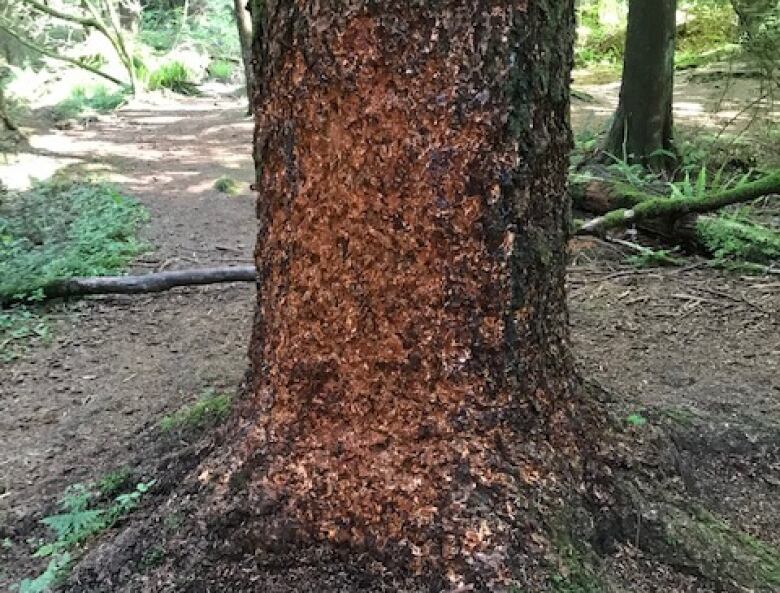Vandals take it out on trees in Metro Vancouver as observers ask, 'Why?'
Charges considered against knife thrower in Stanley Park, bark ripping continues in North Vancouver
Ask anyone if they would willfully damage a tree whether it be in a private yard, park or urban forest and the overwhelming answer would be no, yet vandalism to the earth's most recognizable plant continues around B.C.
The only defence trees have against human harm, whether it be damaging them or chopping them down entirely, is from other humans preventing it.
"It's easy for people to take their frustrations out on a tree," said Stephen Sheppard, a professor with University of British Columbia's urban forestry program.
Trees are seen by many as sentinels of well-being on earth for the services they provide, both biological and spiritual.
While it's hard to know on how often trees are harmed in urban areas, cases of vandalism or illicit cutting aren't hard to come by. There are ongoing cases on the North Shore and Vancouver.

In June, witnesses called police after they saw a man allegedly throwing knives at the trunks of cedar trees in Stanley Park, some hundreds of years old. Police arrested a 33-year-old suspect and have recommended mischief and nuisance charges.
The arrest follows months of bark being scrapped from the trunks of huge, old trees in the landmark Vancouver park.
Park officials asked for the public's help in finding the perpetrator and while police are not connecting the arrest of the knife thrower with tree damage in the park, officials say no new damage has been observed since the arrest.
For the past year, someone has been ripping bark from trees in some District of North Vancouver parks. Officials there are also asking for the public's help.
"Our parks and our trees especially on the North Shore are a huge part of our community and a big reason … why residents love to live here and what they enjoy on a daily basis," said Courtenay Rannard, who speaks for the District of North Vancouver.
"So we know that everyone has the forest's best interest at heart."
Still, someone continues to hack off bark from cedar, Douglas fir and hemlock trees in Princess Park, near Fromme Mountain, Northlands Golf Course and Hunter Park.
The damage is not, so far, fatal, but can lead to diseases more easily getting past a tree's defences.

Why would anyone harm a tree?
Academics like Sheppard and his UBC colleague Lorien Nesbitt, who studies the benefits that trees provide and equitable access to them, say vandalism in urban areas is sometimes associated with poverty or planning that's not inclusive.
"Sometimes vandalism can be sort of an expression of being an outsider in your own city," said Nesbitt.
Both say healthy urban forests depend on education and advocacy, with the goal being to have residents translate a fondness for trees into action such as helping water them during dry summers or even planting them on private property.
"So they can become stewards of those trees and that means really bringing local people into the decision making … at the outset," she said.
Tree killers as villains
For those who choose to damage trees, especially in urban areas, the courts provide a cautionary tale about the consequences.
In 2004, a woman in her 70s who lived in Vancouver's West End was charged with mischief for poisoning five trees, which blocked the view from her oceanfront condo on Beach Avenue.

June Matheson admitted to the crime and even paid $50,000 to the Park Board to have the trees replaced and more planted in other areas.
In 2006, a judge gave her an absolute discharge, meaning no fine, jail time or criminal record, saying in the judgement that Matheson had suffered enough without the court causing more.
Provincial Court Judge Ellen Gordon wrote that Matheson had lived an otherwise exemplary life as a mother, grandmother and contributor to society, but once her crime was made public, any act of contrition was nullified.
"She has been publicly vilified and made a pariah in her community," wrote Gordon who detailed people throwing garbage and dog feces on her balcony and others recommending that damage be done to her design business.
At the time, Crown prosecutors agreed that justice had been served. The Park Board, too, was satisfied, considering the $50,000 compensation payment.